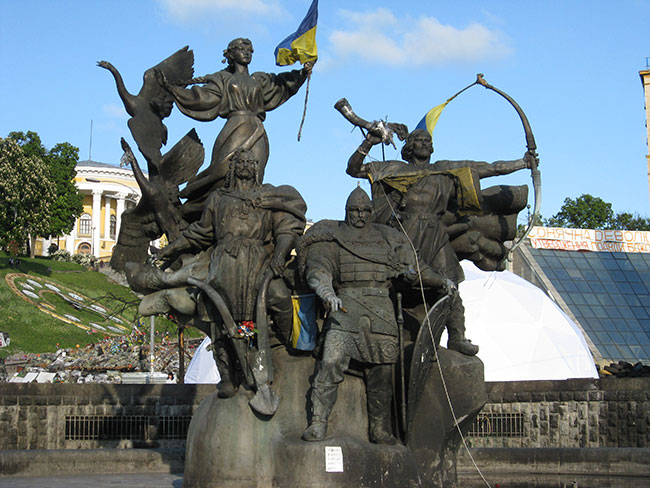By Serhy Yekelchyk
As Ukrainian voters go to the polls this weekend to elect the new president, their country remains stalled at a historical crossroads. A revolution sparked by the previous government’s turn away from Europe, Russia’s flagrant annexation of the Crimea, and the continuing fighting in eastern Ukraine–all these events of recent months can only be understood in their proper historical context.

A monument to the legendary founders of Kyiv re-imagined as a symbol of the pro-European revolution.
One must begin with Russia’s imperial domination of Ukraine during the age when modern nations developed, from the 18th to the 20th centuries. Much like the Scots in the United Kingdom, Ukrainians could make brilliant careers in the Russian imperial service, but their group identity was reduced to an ethnographic curiosity. Moreover, the tsarist government insisted that Ukrainians were not a separate ethnic group, merely the “Little Russian tribe” of the Russian people. Their language was no more than a peasant dialect, and all educated Ukrainians were expected to accept Russian high culture. To prevent a modern idea of nationhood from reaching the Ukrainian masses, the Russian government banned all educational books in Ukrainian in 1863 and literary publications in 1876.
This denial of Ukraine’s national distinctiveness had major implications for modern Russian and Ukrainian identities. The notion of what it meant to be Russian remained linked to the imperial project, first tsarist, then Soviet, and now Putin’s. In all these incarnations, imperial Russia was not prepared to let Ukraine go its way precisely because Russia’s own identity as a modern democratic nation without imperial complexes failed to develop. This explains the rise in Putin’s popularity after the annexation of Crimea. This act of aggression soothed the injured national pride of Russia’s imperial chauvinists, who still mourn the loss of their country’s great-power status.

A fake road sign used by the pro-European protesters in Kyiv: “Changing the country, sorry for the inconvenience.”
The long Russian “fraternal” embrace also had implications for Ukraine’s ambivalent national identity. The Ukrainian national governments of 1917–20 did not stay in power in large part because patriotic intellectuals could not reach out to the peasants in the previous decades. The Bolsheviks first tried to disarm Ukrainian nationalism by promoting education and publishing in Ukrainian, but in the 1930s Stalin decimated the Ukrainian intelligentsia by terror and killed millions of peasants in a man-made famine, the Holodomor. His successors promoted creeping assimilation into the Russian culture. As a result, the population of Ukraine’s southeast, although largely Ukrainian in ethnic compositions, was taught to identify with Russian culture and the Soviet state.
Another thing that the tsars, the commissars, and the Putin administration have in common is an inflated fear of “Ukrainian nationalists.” Its real explanation lies in the fact that the Russian Empire never controlled all Ukrainian ethnolingustic territories. In the 19th century their westernmost part belonged to the Austrian Empire, where the Ukrainians acquired the experience of political participation and communal organization. The tsarist government’s desire to crush the stronghold of “Ukrainian nationalism” in the Austrian province of Galicia was among the international tensions that caused World War I. After the Red Army finally secured this region for the Soviet Union during World War II, the anti-Soviet nationalist insurgency continued for nearly a decade. The spectre of “Ukrainian nationalism” has haunted the Russian political imagination ever since, because it threatened the main tenet of imperial ideology, that of Ukrainians being essentially “uneducated Russians.”

A barricade of tires prepared to be burned on Kyiv’s main boulevard.
In the twenty-three years since the Soviet collapse, the political elites in Russia and Ukraine learned to exploit the ambiguous sense of identity in both countries. The Putin administration discovered imperial chauvinism’s appeal to conservative voters outside of major cities. In Ukraine, President Viktor Yanukovych and his Party of Regions cultivated nostalgia for the Soviet past and identification with Russian culture in their electoral stronghold in the Donbas, the region of Soviet-style smokestack factories propped up by government subsidies. The identity time-bomb was bound to explode at some point, and it went off twice in the past decade.
The Orange Revolution of 2004 began as a mass protest against a rigged election allegedly won by Prime Minister Yanukovych, but grew into a popular civic movement against corruption and political manipulation. Unfortunately, the victors of the revolution did not manage to build a new system, instead descending into political infighting. Yanukovych finally gained the presidency in 2010 and went on to establish an even more corrupt regime. By the end of 2013 Ukrainians were so fed up with their government that the latter’s last-minute withdrawal from the Association Agreement with the European Union sparked another popular revolution.
The protestors on the EuroMaidan were not fighting for Europe and against Russia per se, but against authoritarianism and corruption. However, it is telling that the Putin regime saw their movement as a threat to Russia’s interests. The Russian state-controlled media exploited the presence on the barricades of radical Ukrainian nationalists to paint the entire popular revolution as “fascist.” Without the Russian annexation of the Crimea and barely-concealed support for the separatists in the Donbas, the situation there would also not have reached the brink of a civil war.
In many ways, then, the long-term resolution of the Ukrainian crisis would entail Russians and Ukrainians coming to terms with history–laying the imperial past finally to rest.
Serhy Yekelchyk is Professor of Slavic Studies and History at the University of Victoria (Victoria, British Columbia, Canada) and the author of Ukraine: Birth of a Modern Nation (OUP, 2007).
Subscribe to the OUPblog via email or RSS.
Subscribe to only history articles on the OUPblog via email or RSS.
Images courtesy of Serhy Yekelchyk. Used with permission.
The post History strikes back: Ukraine’s past and the current crisis appeared first on OUPblog.



